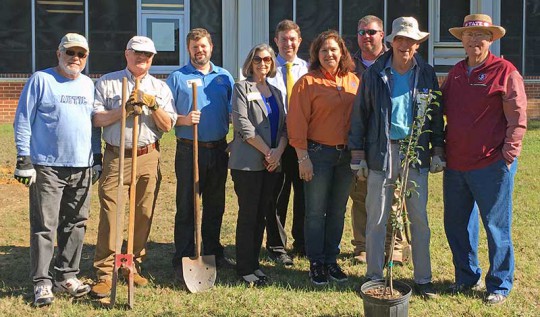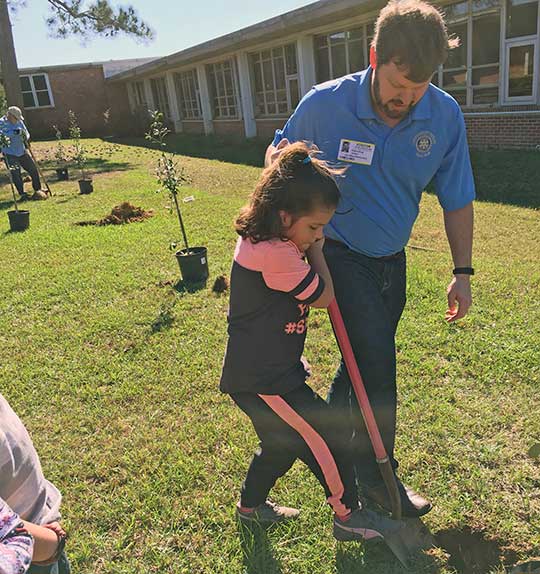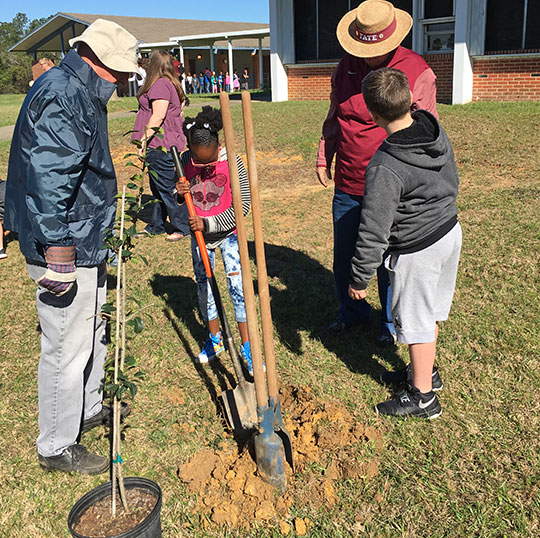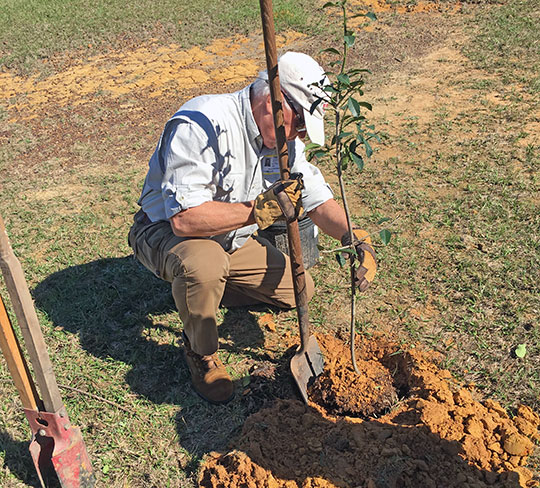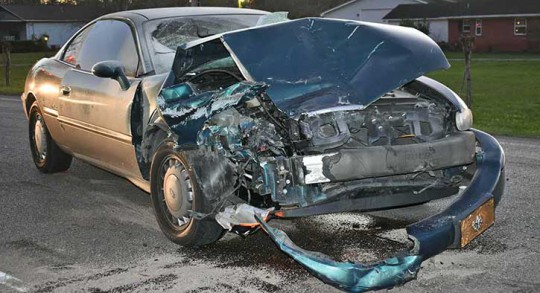Woman Killed In Davis Highway Crash
March 3, 2018
A 31-year old Pensacola woman was killed early Saturday morning in a crash on Davis Highway at I-10.
 The Florida Highway Patrol said 28-year on Sean Reid Wadlow of Pensacola was the driver of a 2015 Chevrolet Impala that was stopped in the center lane on Davis facing north when he pulled into the path of a 2014 Nissan Sentra driven by Lydia Brianne Moretz.
The Florida Highway Patrol said 28-year on Sean Reid Wadlow of Pensacola was the driver of a 2015 Chevrolet Impala that was stopped in the center lane on Davis facing north when he pulled into the path of a 2014 Nissan Sentra driven by Lydia Brianne Moretz.
Moretz was pronounced deceased at the scene.
Wadlow and his passengers, 26-year old Maurice Tyrone Campbell and 24-year old Jesse Dean Fowler, were not injured.
The FHP said Wadlow was not under the influence of alcohol. Their investigation is continuing.
Escambia County Awarded Grant For Eleven Mile Creek Stormwater Project
March 3, 2018
Congressman Matt Gaetz announced Friday an Escambia County stormwater project will receive grant money from the U.S. Treasury Department.
“The Office of Gulf Coast Restoration in the Department of the Treasury plans to award a $268,800.00 grant to Escambia County for planning assistance towards planning, design, and permitting of two stormwater ponds in Escambia County’s Eleven Mile Creek Basin,” he said.
The grant will be funded under the Resources and Ecosystems Sustainability, Tourist Opportunities, and Revived Economies of the Gulf Coast States Act of 2012 (RESTORE Act). The stormwater ponds will reduce downstream stormwater flow rates and improve adjoining floodplains/wetlands, coastal flood protection, and overall water quality for the downstream outfall locations. The activities funded by the grant are identified as planning assistance for a coastal flood protection and related infrastructure eligible activity.
“This award will obligate $268,800.00, approximately 1.6 percent of Escambia County’s $16,589,894.27 Direct Component allocation as of December 31, 2017 from Deepwater Horizon oil spill civil penalties paid after July 6, 2012 under the Federal Water Pollution Control Act,” Gaetz said.
The grant started on March 1, permitting Escambia County to begin the stormwater project and incur costs. The county will later be reimbursed with Direct Component funds.
Pictured: Eleven Mile Creek. Photo for NorthEscambia.com, click to enlarge.
Weekend Gardening: March Tips
March 3, 2018
Here are gardening tips for the month of March from the University of Florida IFAS Extension office:
Flowers
- Annual flowers that can be planted in March include: ageratum, alyssum, amaranthus, asters, baby’s breath, begonia, calendula, celosia, cosmos, dahlia, dusty miller, gaillardia, geranium, hollyhock, impatiens, marigold, nicotiana, ornamental pepper, pentas, phlox, rudbeckia, salvia, sweet Williams, torenia, verbena, vinca and zinnia.
- Caladium bulbs are extremely sensitive to cold soil. There is no advantage to planting early. Purchase caladiums while there is a good selection, but wait until late March or April before planting them in shady beds.
Trees and Shrubs
- Finish pruning summer flowering shrubs such as althea, hibiscus, abelia, oakleaf hydrangea and oleander.
- Delay the pruning of azaleas, camellias, spiraeas, gardenias and other spring flowering shrubs until after flowering is complete.
- Prune any cold weather-damaged plants after new growth appears.
- If needed, fertilize shrubs and small trees with a slow release fertilizer. A good general-purpose landscape fertilizer is a 15-0-15.
- Mature palms should receive an application of granular fertilizer. Use a special palm fertilizer that has an 8-2-12 +4Mg (magnesium) with micronutrients formulation. Apply one pound of fertilizer per 100 sqft of canopy area or landscape area.
- Last opportunity to spray shrubs with dormant horticultural oil.
- Pick up all fallen camellia blossoms and remove them from your property. This practice helps to prevent petal blight next season.
- Prune ornamental grasses.
- If you are in the market for specific colors of azaleas, visit the local nurseries and garden centers this month. Though this is not the most ideal planting time you are assured of the right flower color without having to wait until next blooming season.
Fruits and Nuts
- Time to finish planting bare-root fruit trees.
Vegetable Garden
- This is the month for establishing a spring vegetable garden. Early March plantings have about an even chance of avoiding a late frost.
- The warm season vegetables that can be planted this month are: bush beans, pole beans, lima beans, cantaloupes, sweet corn, cucumbers, eggplant, okra, southern peas, peppers, sweet potatoes, pumpkins, summer squash, winter squash, tomatoes and watermelon.
- The cool season vegetables that can be planted this month are: beets, carrots, celery, collards, endive, kohlrabi, leek, lettuce, mustard, bunching onions, parsley, English peas, Irish potatoes, radish and turnips.
- More conservative gardeners might wish to wait until the middle to latter part of the month to risk tender plants such as tomatoes and peppers.
Lawns
- Remove excessive accumulation of leaves from the lawn. This will increase the effectiveness of fertilizers and pesticides applied to the lawn.
- If a preemergence lawn herbicide is needed to control summer weeds, it should be applied in early March. Make certain to choose one that is safe on your kind of grass.
- Keep lawn herbicides away from the root zones of desirable flower, shrubs and other plants.
- Fertilize the lawn only after the danger of frost has passed and when the grass has greened up. Fertilize using a complete fertilizer applied at 0.5 lbs nitrogen per 1000 sqft containing 50% soluble and 50% slow-release nitrogen.
- Service the lawn mower: include a sharpening of the blade and adjusting of the cutting height for your type of grass.
- Anyone considering establishment of centipedegrass from seed should hold off until the soil warms up and stabilizes above 70°F. Add Item Here…
Cantonment Rotary, Third Graders Plant Trees At Jim Allen Elementary
March 3, 2018
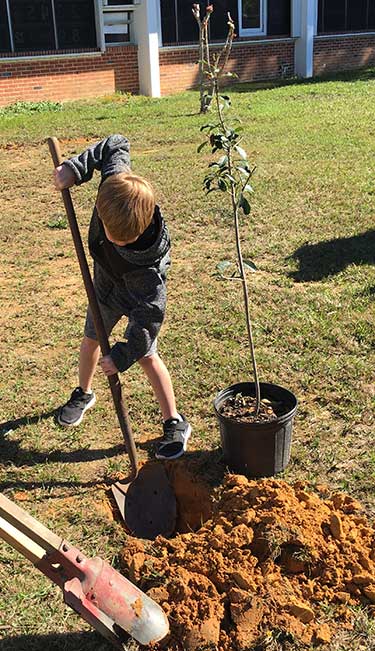 The Cantonment Rotary Club donated several trees to beautify the Jim Allen Elementary School campus. Friday, members of the club planted the trees with the help of Jim Allen third grade students. Photos for NorthEscambia.com, click to enlarge.
The Cantonment Rotary Club donated several trees to beautify the Jim Allen Elementary School campus. Friday, members of the club planted the trees with the help of Jim Allen third grade students. Photos for NorthEscambia.com, click to enlarge.
UWF Football Team Reads To Pine Meadow Elementary Students
March 3, 2018
Members of the University of West Florida football team read books to students Friday Morning at Pine Meadow Elementary School. Friday was National Read Across America Day, an annual reading motivation and awareness program that calls for every child in every community to celebrate reading on March 2, the birthday of beloved children’s author Dr. Seuss. Photos for NorthEscambia.com, click to enlarge.
State Budget Talks Could Be On A ‘Clear Path’
March 3, 2018
Negotiations over a new state budget moved Friday to the top House and Senate budget chairmen, with lawmakers predicting a timely resolution.
“As we move forward and narrow the differences, if you look at where we are now, the amount of things that we’re arguing over now are very modest,” Senate President Joe Negron, R-Stuart, said. “I see a very clear path to resolution.”
The remaining differences in an $87 billion-plus spending plan for 2018-2019 will now be negotiated by Senate Appropriations Chairman Rob Bradley, R-Fleming Island, and House Appropriations Chairman Carlos Trujillo, R-Miami. Conference committees spent part of the week settling issues in the various areas of the budget.
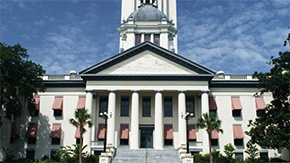 Bradley and Trujillo were scheduled to meet late Friday to continue talks.
Bradley and Trujillo were scheduled to meet late Friday to continue talks.
Any issues left unresolved by the end of the weekend will be decided by Negron and House Speaker Richard Corcoran, R-Land O’Lakes. Lawmakers face a Tuesday deadline to finish the budget. That would allow a required 72-hour “cooling off period” before a vote next Friday, the last scheduled day of the legislative session.
Health care funding remains one of the biggest differences between the chambers. The Senate wants to increase the amount the state pays nursing homes to care for seniors by $130 million, but the House has not embraced that move.
Additionally, the Senate wants to revamp how the state directs Medicaid funds to hospitals. But that move would result in a big cut to Miami’s Jackson Memorial Health System, which could lose upward of $58 million under the Senate’s proposed changes.
Another unresolved issue is funding for the Florida Forever land-buying program, with the Senate pushing for a $100 million program in the new budget year, while the House had started at $57 million.
Negron said Friday that the House was moving closer to the Senate’s position on the land-buying program.
Another unresolved issue is funding for Vivitrol and other medication-assisted treatment options for drug addicts.
Negron downplayed the notion that the House eliminated the funding in its budget as a tactical move aimed at him.
“I’m unapologetic in my support for medication-assisted treatment to treat people with a substance-abuse problem like they are patients, like they have a medical issue that needs to be treated and making sure they have the tools there,” Negron said when asked about Vivitrol funding in the budget.
The House eliminated $7 million for extended-release Naltrexone programs in the budgets of the Office of State Courts Administrator, the Department of Children and Families and the Department of Corrections.
Extended-release Naltrexone, sold as Vivitrol, is a once-a-month injectable non-addictive, non-narcotic medication designed to help prevent drug relapses. The medication blocks receptors in the brain, preventing opioids from creating a high and helping reduce cravings.
The drug is manufactured by Dublin-based Alkermes, which during the 2016 election cycle made $156,500 in campaign contributions, including contributing $50,000 to Negron and political committees he controlled or was affiliated with.
by Christine Sexton, The News Service of Florida
No Injuries In Three Vehicle Cantonment Crash
March 3, 2018
There were no serious injuries in a three vehicle crash late Friday afternoon on Highway 95A near Cedar Tree Lane in Cantonment. The accident is under investigation by the Florida Highway Patrol. NorthEscambia.com photos by Kristi Barbour, click to enlarge.
Commissioners Propose Spending Trust Fund Money On School Resource Officers
March 2, 2018
The Escambia County Commission wants to see money seized from criminals used to help fund school resource officers.
 The commission voted 4-1 Thursday night to send a letter to Gov. Rick Scott calling for a change in how Law Enforcement Trust Fund (LETF) money is spent, setting aside the first 50 percent to fund SRO’s. Commissioner Doug Underhill cast the lone vote against sending the letter.
The commission voted 4-1 Thursday night to send a letter to Gov. Rick Scott calling for a change in how Law Enforcement Trust Fund (LETF) money is spent, setting aside the first 50 percent to fund SRO’s. Commissioner Doug Underhill cast the lone vote against sending the letter.
Florida law already allows, but does not require, LETF money to be spent for school resource officers. The 50 percent funding would become mandatory if the state were to support the plan proposed by the Escambia County Commission.
“In light of the recent school shooting in Parkland, Florida and the increase in school violence across the nation, it is imperative that we take swift action to protect our children and preserve the safety of the public-school system. On behalf of the Escambia County Board of County Commissioners, I am writing to respectfully request your support for legislation requiring no less than 50% of all local expenditures of annual proceeds from Law Enforcement Trust Funds….be used specifically to fund school resource officer programs to provide sworn officers or professional security,” stated the letter, which will be signed by Jeff Bergosh as commission chairman.
“Under your current school safety initiative, which we strongly support, the proposed funding would not adequately fund even one law enforcement officer per school in the Escambia County School District. This measure would provide an additional source of dedicated funding for school resource officers through the Florida Contraband Forfeiture Act, which will help achieve the goal of increasing the presence of sworn officers or trained security officers on school campuses to safeguard students and educators,” the letter states.
In addition to the governor, the letter will also be sent to Senators Doug Broxson and George B. Gainer, and Representatives Clay Ingram, Mel Ponder, Frank White and Jayer Williamson.
LETF money comes from criminal seizures and is to be used to prevent crime.
House Approves Prescription Limits In Opioid Fight
March 2, 2018
While the sponsor acknowledged the bill won’t solve the state’s problem with opioid abuse, the House on Thursday unanimously passed a measure that includes imposing prescription limits.
“I don’t think it (the problem) is going to completely go away, but I think this is a way for us to fight back,” Rep. Jim Boyd, R-Bradenton, said Thursday as he finished presenting his bill (HB 21) to the House.
The bill, in part, would limit opioid prescriptions to three-day supplies, though seven-day supplies would be allowed if deemed medically necessary by physicians. The restrictions wouldn’t apply to patients suffering pain related to cancer, terminal illness, palliative care or serious traumatic injuries.
The goal is to help prevent people from getting hooked on prescription opioids, which can lead to turning to street drugs such as heroin and fentanyl.
Physician groups have had concerns with the bill and the prescription limits.
Rep Julio Gonzalez, a Venice Republican who is an orthopedic surgeon, warned Thursday that the limitations would be too restrictive for some patients and that 10 days may be more appropriate for people who have had major surgery or who have suffered major trauma.
But Boyd told the stories of two people he knows who underwent surgery. One person had complete knee reconstruction and walked out of the facility with a walker hours later. He had a follow-up four days later, Boyd said.
Another friend of Boyd was treated for a heart-valve replacement and an aneurysm repair. Boyd said his friend took Tylenol for three days in the interim between being released and a follow-up visit.
In both instances, Boyd said, the men were given 90-day prescriptions for opioids to relieve the pain.
“We are not trying to be doctors,” Boyd said, addressing Gonzalez’s criticism. “We are not trying to tell doctors how to do what they do, because they are the professionals. But I think there’s a little bit of work that needs to be done communicating, that with this horrible problem, we need to take dramatic steps to try to fix it.”
Opioid addiction and overdoses are now the leading accidental cause of death in the U.S. According to research, 80 percent of heroin users first abused prescription drugs, whether their own drugs or someone else’s supply. Other studies show that a patient’s chances of addiction increase as the number of days a first prescription for opioids lengthens.
The data has spurred state lawmakers to focus not only on treating drug users but on trying to keep patients from getting hooked in the first place.
To ensure that patients aren’t “doctor shopping,” or seeking prescriptions for addictive drugs from multiple physicians, the bill also would require physicians to consult a statewide database before prescribing or dispensing controlled substances, something many physicians have been loath to do. Only about 27 percent of Florida health care providers authorized to prescribe controlled substances currently use the database, known as the prescription drug monitoring program.
The bill includes accommodations if the database is down or if there are electrical or technical issues. But in such instances, physicians would be required to document information in patient medical records and would be limited to prescribing three-day supplies or less of pain relievers.
The bill also would authorize the Department of Health to share and exchange database information with other states and would authorize the database to interface with electronic health systems used by health-care practitioners and facilities.
Lawmakers have directed about $1 million for improvements to the prescription drug monitoring program, but Rep. Gayle Harrell, R-Stuart, worried that the funding may not be enough to ensure that the database properly interfaces with electronic health systems used by physicians.
Harrell, who is married to a physician, said she shared Gonzalez’s concerns that the restrictions may go too far.
“I think the 10 days seems much more reasonable,” she said.
A Senate version of the bill (SB ![]() is ready to be heard by the full Senate.
is ready to be heard by the full Senate.
But the House and Senate bills have differences. Among other things, the Senate bill would not allow exclusions from the prescription restrictions for cancer patients, trauma patients and the terminally ill.
Boyd, who will leave the House this fall because of term limits, said the bill would help in the fight against opioid abuse but said he knows it won’t fix the problem.
“I’ll be gone next year but I hope that others of you will take up the fight and take the next steps to fight this problem, because I don’t think it’s going to completely go away,” he said.
by The News Service of Florida
BBB Warns Of Local Bail Bonds Scammer
March 2, 2018
The Better Business Bureau (BBB) is warning of a scam in the Escambia County area.
 The BBB said someone is calling area residents claiming to be from Any Hour Bail Bonds informing them that a family member is in jail and they need to purchase Green Dot money cards and meet them at a certain location.
The BBB said someone is calling area residents claiming to be from Any Hour Bail Bonds informing them that a family member is in jail and they need to purchase Green Dot money cards and meet them at a certain location.
Reports indicate that the caller has the name, birthdate and address of the family member and called the victim’s personal cell phone. In one report the name the caller used was Travis Nelson, and he was calling from (850) 206-6049.
The incidents have been reported to local law enforcement.
The BBB is cautioning consumers to be on alert when answering calls that their loved ones are in trouble and money is needed right away. You should never give money (via pre-paid cards, cash, wire transfer, etc.) to anyone you do not know and always check with your loved one as to their current situation, according to the BBB.




